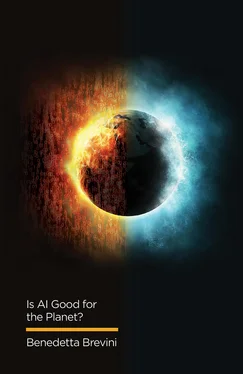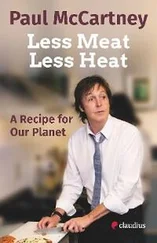94 89
95 90
96 91
97 92
98 93
99 94
100 95
101 96
102 97
103 98
104 99
105 100
106 101
107 102
108 103
109 104
110 105
111 106
112 107
113 108
114 109
115 112
116 113
117 114
118 115
119 116
120 117
121 118
122 119
123 120
124 121
125 122
126 123
127 124
128 125
129 126
130 127
131 128
132 129
Benedetta Brevini, Is AI Good for the Planet?
Axel Bruns, Are Filter Bubbles Real?
Richard Maxwell & Toby Miller, How Green Is Your Smartphone?
Milton Mueller, Will the Internet Fragment?
Neil Selwyn, Should Robots Replace Teachers?
Neil Selwyn, Is Technology Good for Education?
Is AI Good for the Planet?
BENEDETTA BREVINI
polity
Copyright © Benedetta Brevini 2022
The right of Benedetta Brevini to be identified as Author of this Work has been asserted in accordance with the UK Copyright, Designs and Patents Act 1988.
First published in 2022 by Polity Press
Polity Press
65 Bridge Street
Cambridge CB2 1UR, UK
Polity Press
101 Station Landing
Suite 300
Medford, MA 02155, USA
All rights reserved. Except for the quotation of short passages for the purpose of criticism and review, no part of this publication may be reproduced, stored in a retrieval system or transmitted, in any form or by any means, electronic, mechanical, photocopying, recording or otherwise, without the prior permission of the publisher.
ISBN-13: 978-1-5095-4796-8
A catalogue record for this book is available from the British Library.
The publisher has used its best endeavours to ensure that the URLs for external websites referred to in this book are correct and active at the time of going to press. However, the publisher has no responsibility for the websites and can make no guarantee that a site will remain live or that the content is or will remain appropriate.
Every effort has been made to trace all copyright holders, but if any have been overlooked the publisher will be pleased to include any necessary credits in any subsequent reprint or edition.
For further information on Polity, visit our website: politybooks.com
I have been inspired, shocked and challenged by the company of many scholars, environmental activists, artists and thinkers when writing this book. I am most grateful for the intellectual generosity of the people who have read portions of this manuscript and supported me on this journey. First and foremost my wonderful friend and editor in chief, Fiona Giles, whose literary and academically rigorous comments helped to keep me focused, at a time when the world seemed to be falling apart during the pandemic. I am also grateful to a group of women who are a constant inspiration to me, for their activism, strength and integrity: Vicky Mayer, Alana Mann, Priscilla Karant, Terry Woronov, Lyn Hsieh, Sarah Gong, Lucia Sorbera, Laura Forlano, Melinda Rankin and Felicity Ruby. I am grateful for the feedback I received from Graham Murdock, and our constant exchanges – Graham is the best mentor in the world. I’m also grateful to Frank Pasquale for our numerous conversations on AI, public interest and our beloved political economy. My unbounded thanks to Mary Savigar at Polity Press for believing in this project since its start and whose thoughtful comments helped bring the manuscript to life. Finally, a special thank you to my family, for the love I always received and for giving me the strength, values and determination to always fight for a more just world.
Imagine sitting at your desk during one of those long COVID-19 lockdowns and remotely controlling a cartoon-like character that has your features. You’ve given her your name and move her through the big Piazza del Duomo in Milan – yes, just beside la Galleria – so she can buy that cool dress for you by Dolce & Gabbana that you’ve been dreaming about for ages.
This isn’t a video game. It’s your cheaply rented humanoid robot shopping for you, trying on clothes for you, giving you the best advice on colour combinations on the basis of your thousands of previous Google searches, then even mailing your purchase to your home address. And next, you send your robot-you to visit your mum, to keep her company until you have time to call her for a live video stream conversation. Meanwhile your robot-you sends your mum your favourite poetry, which your robot knows better than you do, thanks to the algorithm that revisits your YouTube and Netflix feeds.
We often think of artificial intelligence (AI) as a thing of the immediate future. This is hardly surprising, because we are constantly bombarded by slogans of AI coming to change our life, whether we like it or not. We are reassured it will be a better life. A better capitalism. A better environment. But AI is already here, and perhaps many of you didn’t even notice – since many AI applications are already so embedded in our everyday life they no longer capture our attention.
Think of the AI-enabled camera that helps control traffic at the next intersection you cross. Or the facial recognition scan that you are forced to go through when you are at the stadium entrance. Think of all the latest smart phone applications, all running a variety of AI programs, when you are recommended music videos on YouTube, or when the Facebook app on your mobile scans your newsfeed in search of fake news, until you go home to your Google Home and Amazon Alexa.
But there is much more. AI technologies are translating languages, advising corporations on investments, flying drones, diagnosing diseases, protecting borders.
Fancy a social bot to overcome loneliness? Microsoft’s Xiaoice (pronounced Shou-ice) chatbot recently became a global phenomenon with over 660 million international users and a reach of over 450 million smart devices (Zhang 2020). Xiaoice, which means ‘Little Bing’ in Chinese, was launched in 2014 by a small team of researchers and has since gained notoriety as a ‘virtual girlfriend’ across China, Japan and Indonesia. Presented as a teenage girl, Xiaoice is built on an empathetic computing framework that enables machine recognition of feelings and states, allowing dynamic responses; and this results in an AI companion with high emotional intelligence, which encourages long-term connections with its users.
‘If we lose our environment, we lose our planet and our lives. We must understand and debate the environmental costs of AI.’
There is also a significant amount of research connecting AI systems to applications in medicine. An international study examining the potential use of AI in the field of dermatology has found improved diagnostic accuracy and clinical decision-making when AI is used in conjunction with human clinical checks, suggesting stronger results than the use of AI or experts alone (Tschandl et al. 2020). The artificial neural networks analyse uploaded pictures and identify potential sites of malignant melanoma; this is currently being tested in an Australian skin clinic. The program has since been able to recognize melanoma at sizes smaller than the human eye can detect, for instance melanomas as small as 0.2 millimetres (UQ News 2020).
This is without mentioning AI’s current applications in the global conservation field – from modelling biodiversity loss to monitoring migratory species and climate change scenarios. AI’s emerging use in agriculture has aimed to optimize everything from crop production to resource consumption, harvesting, monitoring and processing. In 2019, twenty-five European countries signed a declaration of cooperation for the digitalization of agriculture, in an acknowledgement of the potential power of digital technologies and with the goal to establish infrastructure designed to support a smart agri-food sector (European Commission 2020a). Projects funded by the European Union (see Brevini and Murdock 2017) include Sweeper, a sweet pepper-harvesting robot that uses algorithms for fruit detection and localization and that was the first of its kind to demonstrate harvest success in a commercial greenhouse (Arad et al. 2020).
Читать дальше












